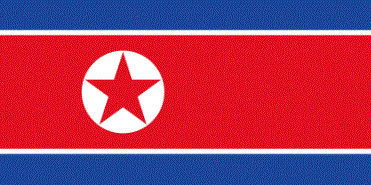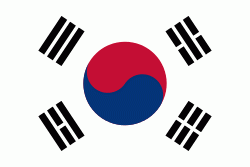Korean language
Korean (South Korean:, hangugeo; North Korean: , chosŏnmal) is the native language for about 80 million people, mostly of Korean descent. It is the official and national language of both North Korea and South Korea (geographically Korea), but over the past years of political division, the two Koreas have developed some noticeable vocabulary differences. Beyond Korea, the language is recognised as a minority language in parts of China, namely Jilin Province, and specifically Yanbian Prefecture and Changbai County. It is also spoken by Sakhalin Koreans in parts of Sakhalin, the Russian island just north of Japan, and by the Koryo-saram in parts of Central Asia. The language has a few extinct relatives which—along with the Jeju language (Jejuan) of Jeju Island and Korean itself—form the compact Koreanic language family. Even so, Jejuan and Korean are not mutually intelligible with each other. The linguistic homeland of Korean is suggested to be somewhere in contemporary Northeast China. The hierarchy of the society from which the language originates deeply influences the language, leading to a system of speech levels and honorifics indicative of the formality of any given situation.
Modern Korean is written in the Korean script ( in South Korea, in North Korea), a system developed during the 15th century for that purpose, although it did not become the primary script until the 20th century. The script uses 24 basic letters (jamo) and 27 complex letters formed from the basic ones. When first recorded in historical texts, Korean was only a spoken language; all written records were maintained in Classical Chinese, which, even when spoken, is not intelligible to someone who speaks only Korean. Later, Chinese characters adapted to the Korean language, Hanja, were used to write the language for most of Korea's history and are still used to a limited extent in South Korea, most prominently in the humanities and the study of historical texts.
Since the turn of the 21st century, aspects of Korean culture have spread to other countries through globalization and cultural exports. As such, interest in Korean language acquisition (as a foreign language) is also generated by longstanding alliances, military involvement, and diplomacy, such as between South Korea–United States, China–North Korea and North Korea–Russia since the end of World War II and the Korean War. Along with other languages such as Chinese and Arabic, Korean is ranked at the top difficulty level for English speakers by the United States Department of Defense.
Modern Korean descends from Middle Korean, which in turn descends from Old Korean, which descends from the Proto-Koreanic language which is generally suggested to have its linguistic homeland. Whitman (2012) suggests that the proto-Koreans, already present in northern Korea, expanded into the southern part of the Korean Peninsula at around 300 BC and coexisted with the descendants of the Japonic Mumun cultivators (or assimilated them). Both had influence on each other and a later founder effect diminished the internal variety of both language families.
Since the Korean War, through 70 years of separation, North–South differences have developed in standard Korean, including variations in pronunciation and vocabulary chosen, but these minor differences can be found in any of the Korean dialects, which are still largely mutually intelligible.
Modern Korean is written in the Korean script ( in South Korea, in North Korea), a system developed during the 15th century for that purpose, although it did not become the primary script until the 20th century. The script uses 24 basic letters (jamo) and 27 complex letters formed from the basic ones. When first recorded in historical texts, Korean was only a spoken language; all written records were maintained in Classical Chinese, which, even when spoken, is not intelligible to someone who speaks only Korean. Later, Chinese characters adapted to the Korean language, Hanja, were used to write the language for most of Korea's history and are still used to a limited extent in South Korea, most prominently in the humanities and the study of historical texts.
Since the turn of the 21st century, aspects of Korean culture have spread to other countries through globalization and cultural exports. As such, interest in Korean language acquisition (as a foreign language) is also generated by longstanding alliances, military involvement, and diplomacy, such as between South Korea–United States, China–North Korea and North Korea–Russia since the end of World War II and the Korean War. Along with other languages such as Chinese and Arabic, Korean is ranked at the top difficulty level for English speakers by the United States Department of Defense.
Modern Korean descends from Middle Korean, which in turn descends from Old Korean, which descends from the Proto-Koreanic language which is generally suggested to have its linguistic homeland. Whitman (2012) suggests that the proto-Koreans, already present in northern Korea, expanded into the southern part of the Korean Peninsula at around 300 BC and coexisted with the descendants of the Japonic Mumun cultivators (or assimilated them). Both had influence on each other and a later founder effect diminished the internal variety of both language families.
Since the Korean War, through 70 years of separation, North–South differences have developed in standard Korean, including variations in pronunciation and vocabulary chosen, but these minor differences can be found in any of the Korean dialects, which are still largely mutually intelligible.
Country
-
North Korea
North Korea, officially the Democratic People's Republic of Korea (DPRK), is a country in East Asia. It constitutes the northern half of the Korean Peninsula and shares borders with China and Russia to the north at the Yalu (Amnok) and Tumen rivers, and South Korea to the south at the Korean Demilitarized Zone. North Korea's border with South Korea is a disputed border as both countries claim the entirety of the Korean Peninsula. The country's western border is formed by the Yellow Sea, while its eastern border is defined by the Sea of Japan. North Korea, like its southern counterpart, claims to be the legitimate government of the entire peninsula and adjacent islands. Pyongyang is the capital and largest city.
In 1910, Korea was annexed by the Empire of Japan. In 1945, after the Japanese surrender at the end of World War II, Korea was divided into two zones along the 38th parallel, with the north occupied by the Soviet Union and the south occupied by the United States. Negotiations on reunification failed, and in 1948, separate governments were formed: the socialist and Soviet-aligned Democratic People's Republic of Korea in the north, and the capitalist, Western-aligned Republic of Korea in the south. The Korean War began in 1950, with an invasion by North Korea, and lasted until 1953. The Korean Armistice Agreement brought about a ceasefire and established a demilitarized zone (DMZ), but no formal peace treaty has ever been signed. -
South Korea
South Korea, officially the Republic of Korea, is a country in East Asia. It constitutes the southern part of the Korean Peninsula and borders North Korea along the Korean Demilitarized Zone. The country's western border is formed by the Yellow Sea, while its eastern border is defined by the Sea of Japan. South Korea claims to be the sole legitimate government of the entire peninsula and adjacent islands. It has a population of 51.96 million, of which roughly half live in the Seoul Capital Area, the fourth most populous metropolitan area in the world. Other major cities include Incheon, Busan, and Daegu.
The Korean Peninsula was inhabited as early as the Lower Paleolithic period. Its first kingdom was noted in Chinese records in the early 7th century BCE. Following the unification of the Three Kingdoms of Korea into Silla and Balhae in the late 7th century, Korea was ruled by the Goryeo dynasty (918–1392) and the Joseon dynasty (1392–1897). The succeeding Korean Empire (1897–1910) was annexed in 1910 into the Empire of Japan. Japanese rule ended following Japan's surrender in World War II, after which Korea was divided into two zones; a northern zone occupied by the Soviet Union and a southern zone occupied by the United States. After negotiations on reunification failed, the southern zone became the Republic of Korea in August 1948 while the northern zone became the communist Democratic People's Republic of Korea the following month.
